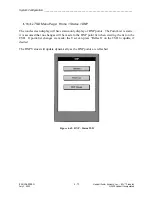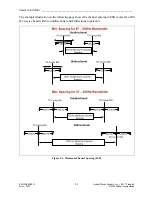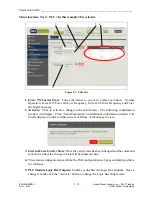
Power Line Carrier ____________________________________________________________________
RF-MCGARDPRO
Hubbell Power Systems, Inc.
–
RFL™
Products
July 1, 2022
©2022 Hubbell Incorporated
5-4
5.1.2 On/Off Operation
On/Off operation defines the absence of a tone (Off) to be the guard condition. The presence of
a tone (On) is the block condition. Since there is no tone present under normal non-block
operating conditions, no receive AGC functions may be performed. Therefore, the nominal
receive signal level is determined during deployment, and the operating parameters of the system
are set accordingly and maintained in non-volatile memory of the Module.
In order to determine that the link is operating normally, a checkback process is used to test the
link. For the purposes of checkback, the Module at the near end of the link is defined as the
Master and the Module at the far end of the link is defined as the Remote. During checkback, a
pre-defined sequence of On/Off states (checkback codes) is transmitted by the Master to the
Remote which responds with an acknowledgement on a successful reception.
The Remote responds in one of two ways depending on how the Master terminates its
transmission of the Checkback Code. One of two responses will occur:
1)
Hard Carrier Mode
: If the Master leaves the tone on for 5 or more seconds after the last
bit of the Checkback Code, the Remote responds in Hard Carrier Mode. In Hard Carrier
Mode, the Remote responds by transmitting a tone to the Master for a pre-defined length
of time.
2)
Normal Mode
: Otherwise, the Remote responds in Normal Mode. In Normal Mode, the
Remote responds by transmitting a pre-defined sequence of On/Off states (called the
Acknowledgement Code) to the Master.
Four Hard Carrier transmitted codes and two received codes can be programmed into either the
master or remote units. Operation from either end is possible.
Checkback may be initiated automatically by either the Master or the Remote. It may also be
initiated manually by the user. Remote initiation is accomplished by sending a specific code to
the master. This code tells the master to initiate a test sequence. This code is not available as a
response code from remotes for normal tests.
On/Off Systems transmit and receive on the same frequency. Therefore, the local receiver cannot
differentiate between remote transmissions and local transmissions. In addition, checkback
sequences are detected as a sequence of block events. The local receiver will report all block
events through the Logic Bus interface whether the source is from local transmissions, checkback
sequences, or real block events. It is up to the logging mechanism in the Logic Controller to filter
out unwanted SOE reports. To aid in this filtering the module will indicate that a test is in process
through a bit on the logic bus that is active while a test is ongoing in a master or while an incoming
code is detected in a remote.
The performance of On/Off operation is defined by the Maximum Block Transport Delay,
Dependability and Security. These are the same definitions for FSK in
the Maximum Block Transport Delay for On/Off operation is defined by the three operational
configurations given in the table below,






























